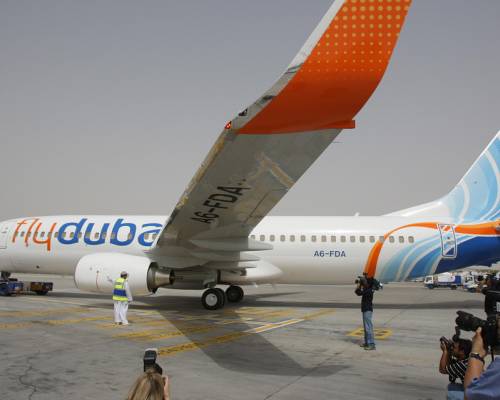How will the shooting at a Dubai airline affect other flights to Baghdad?
We use cookies to help us deliver our online services. By using our website or by closing this message box, you agree to our use of cookies as described in our Cookie Policy.
WSJ EUROPE
WSJ LIVE
REALTOR.COM
BARRON'S
MEMBERSHIP
DJX
MORE
SEARCH
The Wall Street Journal
Menu
WORLD
LOG IN SUBSCRIBE
45
WORLD NEWS
Shots Fired at FlyDubai Flight Landing in Baghdad
Several Airlines Cancel Flights as Attack Reignites Concerns About Flying Through Conflict Zones
The arrival on May 18, 2009 of the first of flydubai's 50 Boeing 737-800 Next Generation aircraft in the Gulf emirate. ENLARGE
The arrival on May 18, 2009 of the first of flydubai's 50 Boeing 737-800 Next Generation aircraft in the Gulf emirate. PHOTO: AGENCE FRANCE-PRESSE/GETTY IMAGES
By RORY JONES in Dubai, and SAFA M. MAJEED and GHASSAN ADNAN in Baghdad
Updated Jan. 27, 2015 10:41 a.m. ET
3 COMMENTS
A plane carrying 154 passengers came under fire on Monday after landing at Baghdad International Airport in a possible Islamic State attack, prompting airlines to cancel flights and reigniting concerns about flying through conflict zones.
Low-cost carrier FlyDubai said early Tuesday that flight FZ215 to Baghdad was fired at by small arms as it landed just before 5 p.m. local time, damaging the fuselage of the Boeing 737-800 aircraft. All passengers disembarked normally through the jet bridge and no medical attention was required at the airport, FlyDubai said.
Aviation and security officials said that three or four shots that appeared to be sniper fire were discharged from Radwaniya, south of the airport.
But the intention and perpetrators of the attack were unclear by Tuesday evening as security officials claimed the attack was deliberate while aviation officials sought to show they had the safety of the airport under control after multiple airlines suspended flights.
Concerns about airlines flying into conflict zones have grown in the past year after Malaysia Airlines Flight 17 was shot down over Ukraine in July, killing all 298 people on board. Airlines had largely stopped flying over Iraqi airspace after the advance into the country last year of Islamic State.
The U.S. and its Arab allies in September began launching airstrikes against Islamic State in both Iraq and Syria. Saad Al Mutalibi, a member of the security committee in Baghdad’s provincial council, suspected the militant group had shot at the plane in an attempt to disrupt aviation services to Iraq. Mr. Mutalibi offered no evidence for his claim.
Security forces had launched an operation in the Abu Ghraib area to the west of Baghdad to secure the perimeter of the airport, Mr. Mutalibi said by phone on Tuesday.
Transport Minister Baqer Al Zubaidi said the airport was running with “no problems at all” and called on Arab counties to resume flights to Baghdad.
“We will take tough measures against the attackers of the plane whoever they are,” Mr. Zubaidi said in a televised statement on a local channel on Tuesday evening.
FlyDubai on Monday sent a replacement aircraft to Iraq to carry passengers back to Dubai, and then suspended flights to Baghdad until further notice as a result of the shooting.
Preliminary information provided to FlyDubai indicated the shots fired were unintentional, the airline said in an updated statement on Tuesday, without elaborating.
Abu Dhabi’s Etihad Airways said it would also suspend flights to the Iraqi capital after the General Civil Aviation Authority in the United Arab Emirates issued a ban on flying to the city due to security concerns.
Dubai’s Emirates Airline, the world’s biggest international carrier by traffic flown, Air Arabia and Turkish Airlines also canceled flights to Baghdad. But Emirates said it would continue flying to Erbil in Iraq’s Kurdistan region and Basra in the south of the country.
The U.A.E.’s Ministry of Foreign Affairs summoned the Iraqi ambassador to its offices to demand an investigation into the incident, according to the country’s news agency.
“The U.A.E. plane incident is a deliberate attack. It’s not a casual, unintentional,” Hamid Al Mutlaq, a member of the security and defense committee in Iraq’s parliament, said by phone on Tuesday.
The U.S. government in August told airlines flying over Iraq to remain at higher altitudes. U.S. carriers are now prohibited from flying over the country below 30,000 feet, while European safety regulators issued similar guidance.
Iraq was previously a busy trunk route for airlines traveling between Europe and the Persian Gulf hubs in Dubai, Abu Dhabi and Doha, or beyond to Southeast Asia. Air France , Deutsche Lufthansa AG and Virgin Atlantic Airways all said they had ceased flying over Iraq.
Etihad and Emirates had diverted most of their traffic through Iran’s airspace to connect to Europe and some ports in the U.S. But the airlines had continued flying direct to Iraq.
The International Civil Aviation Organization, the aviation safety arm of the United Nations, is due to host a meeting on commercial flights in areas of conflict in the coming weeks in Montreal. Stakeholders are trying to find a balance between keeping flights safe and avoiding unnecessary disruptions to airlines and their passengers.
Write to Rory Jones at [email protected]


